湖北英语高一新苏版(1)unit2教案(1—4课时)
高中英语必修一unit2教案
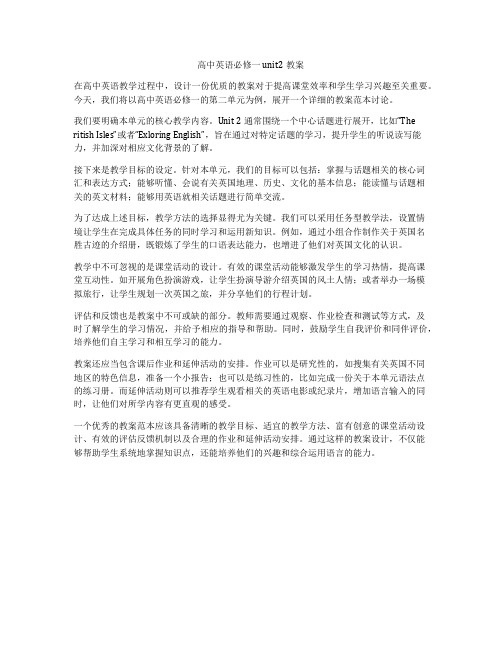
高中英语必修一unit2教案在高中英语教学过程中,设计一份优质的教案对于提高课堂效率和学生学习兴趣至关重要。
今天,我们将以高中英语必修一的第二单元为例,展开一个详细的教案范本讨论。
我们要明确本单元的核心教学内容。
Unit 2通常围绕一个中心话题进行展开,比如“The ritish Isles”或者“Exloring English”,旨在通过对特定话题的学习,提升学生的听说读写能力,并加深对相应文化背景的了解。
接下来是教学目标的设定。
针对本单元,我们的目标可以包括:掌握与话题相关的核心词汇和表达方式;能够听懂、会说有关英国地理、历史、文化的基本信息;能读懂与话题相关的英文材料;能够用英语就相关话题进行简单交流。
为了达成上述目标,教学方法的选择显得尤为关键。
我们可以采用任务型教学法,设置情境让学生在完成具体任务的同时学习和运用新知识。
例如,通过小组合作制作关于英国名胜古迹的介绍册,既锻炼了学生的口语表达能力,也增进了他们对英国文化的认识。
教学中不可忽视的是课堂活动的设计。
有效的课堂活动能够激发学生的学习热情,提高课堂互动性。
如开展角色扮演游戏,让学生扮演导游介绍英国的风土人情;或者举办一场模拟旅行,让学生规划一次英国之旅,并分享他们的行程计划。
评估和反馈也是教案中不可或缺的部分。
教师需要通过观察、作业检查和测试等方式,及时了解学生的学习情况,并给予相应的指导和帮助。
同时,鼓励学生自我评价和同伴评价,培养他们自主学习和相互学习的能力。
教案还应当包含课后作业和延伸活动的安排。
作业可以是研究性的,如搜集有关英国不同地区的特色信息,准备一个小报告;也可以是练习性的,比如完成一份关于本单元语法点的练习册。
而延伸活动则可以推荐学生观看相关的英语电影或纪录片,增加语言输入的同时,让他们对所学内容有更直观的感受。
一个优秀的教案范本应该具备清晰的教学目标、适宜的教学方法、富有创意的课堂活动设计、有效的评估反馈机制以及合理的作业和延伸活动安排。
江苏省高一英语上册 第二单元全套教案

江苏省高一英语上册第二单元全套教案(外研社版)
教材简析:本单元以My new teachers为主题,分为词汇、阅读、语法、听力四个课时。
通过本单元学习,培养学生热爱新集体、新老师和新同学的感情,鼓励学生参与各种英语活动,克服困难。
学前准备:多媒体、PPT、课文录音、导学案。
学习目标:
1)知识与能力目标:
1.掌握并记忆本单元的重点词汇和短语。
2.培养学生的阅读能力,训练学生的阅读速度,查读的阅读技巧;训练学生学会找主题句,归纳文章主旨。
运用想象、联想,学会用英语思考的能力。
3.训练和提高学生的听力能力和听力技巧。
4.理解并掌握动名词做宾语的用法。
5.学习如何用英语来描写一位你喜欢的老师。
2)过程与方法目标:
1.通过阅读课文来加深学生对新老师的印象,让学生了解高中老师与初中老师的不同。
2.通过朗读指导、自主探究、小组活动等方面来引导学生掌握这个单元的单词、文章和知识点。
3)情感态度价值观目标:
培养学生热爱新集体、新老师和新同学的感情。
积极参与各种英语活动,克服困难。
教学重点:
1.学习和掌握本单元生词。
2.掌握并灵活运用动名词作宾语的用法。
教学难点:
1.多层次地训练阅读和听力能力,提高阅读和听力水平。
2.教会学生灵活使用词汇、短语和句型来做题。
单元课时分配:6个课时。
新教材高一英语UNIT2教案
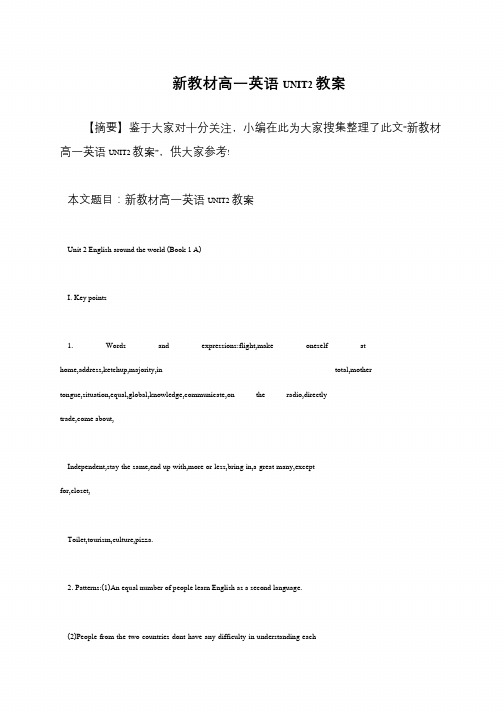
good time to ask the students to report requests anddemands.
Step5:exercises for period 1(新教材高一英语UNIT2教案)
翻译下列句子
1.我总共有2000册书(total)
2.英语发展成为世界上用得最广泛的语言
other.(新教材高一英语UNIT2教案)
(3)Mother told me not to leave the door open after midnight.
(4)Most of the native speakers of English are found in
3. Grammar:Direct speech and indirect speech;requests and orders or commands.
for,closet,
Toilet,tourism,culture,pizza.
2. Patterns:(1)Anequal number of people learn English as a second language.
(2)Peoplefromthetwocountriesdonthaveanydifficultyinunderstandingeach
home,address,ketchup,majority,intotal,mother
tongue,situation,equal,global,knowledge,communicate,ontheradio,directly
trade,come about,
Independent,staythesame,endupwith,moreorless,bringin,agreatmany,except
江苏新教材高一英语unit2 Reading教案+学案
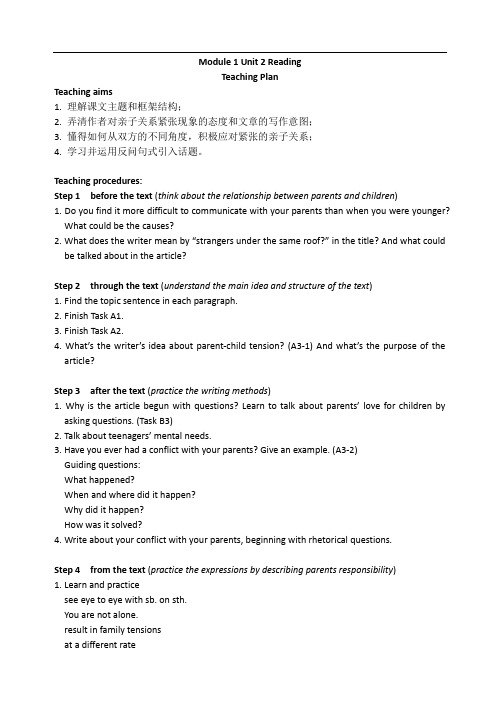
Module 1 Unit 2 ReadingTeaching PlanTeaching aims1. 理解课文主题和框架结构;2. 弄清作者对亲子关系紧张现象的态度和文章的写作意图;3. 懂得如何从双方的不同角度,积极应对紧张的亲子关系;4. 学习并运用反问句式引入话题。
Teaching procedures:Step 1 before the text (think about the relationship between parents and children)1. Do you find it more difficult to communicate with your parents than when you were younger? What could be the causes?2. What does the writer mean by “strangers under the same roof?” in the title? And what could be talked about in the article?Step 2 through the text (understand the main idea and structure of the text)1. Find the topic sentence in each paragraph.2. Finish Task A1.3. Finish Task A2.4. What’s the writer’s idea about parent-child tension? (A3-1) And what’s the purpose of the article?Step 3 after the text (practice the writing methods)1. Why is the article begun with questions? Learn to talk about parents’ love for children by asking questions. (Task B3)2. Talk about teenagers’ mental needs.3. Have you ever had a conflict with your parents? Give an example. (A3-2)Guiding questions:What happened?When and where did it happen?Why did it happen?How was it solved?4. Write about your conflict with your parents, beginning with rhetorical questions.Step 4 from the text (practice the expressions by describing parents responsibility)1. Learn and practicesee eye to eye with sb. on sth.You are not alone.result in family tensionsat a different rateit can be a headache to domental needshave a desire for sth./to do sth.feel ready to doWhy can’t they let me go?on the other handit may seem impossible to dotake action to improve the situationthe key to doingfrom one’s point of viewrelax one’s controli t’s completely normal to doThe good ne ws is that …2. How are parents responsible for the parent-child tension? What suggestions do you have for them? (Task A3-3)3. Finish Task B1, and write back to Mrs. ZhaoStep 5 beyond the text (learn about word usages by describing growing pains)1. Look it upanxiousdesireconcernaddressstruggleturn outargueModule 1 Unit 2 ReadingLearning GuidanceI. Learning aims1. 理解课文主题和框架结构;2. 弄清作者对亲子关系紧张现象的态度和文章的写作意图;3. 懂得如何从双方的不同角度,积极应对紧张的亲子关系。
新教材高一英语UNIT2教案
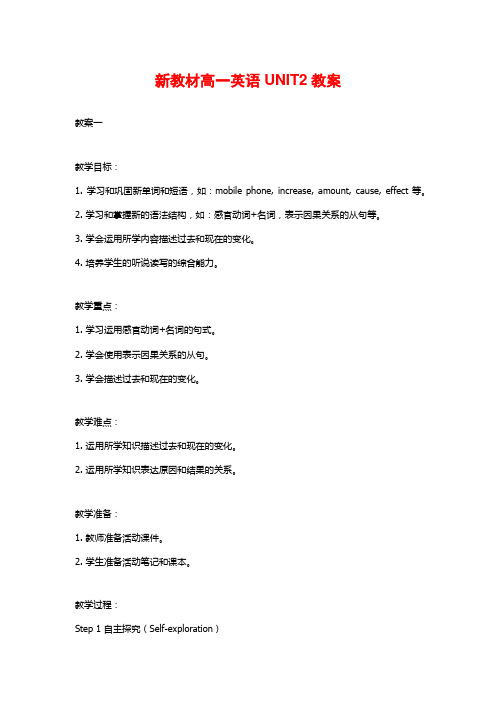
新教材高一英语UNIT2教案教案一教学目标:1. 学习和巩固新单词和短语,如:mobile phone, increase, amount, cause, effect等。
2. 学习和掌握新的语法结构,如:感官动词+名词,表示因果关系的从句等。
3. 学会运用所学内容描述过去和现在的变化。
4. 培养学生的听说读写的综合能力。
教学重点:1. 学习运用感官动词+名词的句式。
2. 学会使用表示因果关系的从句。
3. 学会描述过去和现在的变化。
教学难点:1. 运用所学知识描述过去和现在的变化。
2. 运用所学知识表达原因和结果的关系。
教学准备:1. 教师准备活动课件。
2. 学生准备活动笔记和课本。
教学过程:Step 1 自主探究(Self-exploration)1. 学生观察并记录图片上的物品,用感官动词表示出来。
如:I can hear the sound of music.2. 学生合作讨论向导读教材的时间转移。
3. 学生观察后记录方法,总结并检查记录是否准确。
Step 2 知识讲解(Presentation)1. 教师出示一组单词卡片,并引导学生将其与画出的物品进行匹配。
学生边匹配边发音、拼读。
2. 教师讲解词义、用法和拼读,并让学生读一遍。
3. 教师通过图片和例句,介绍句式“感官动词+名词”。
Step 3 合作探究(Cooperation)1. 学生跟随教师的指导,以分组为单位合作完成课本练习。
2. 学生重新组合词语并创造句子。
3. 学生相互交换伴读和合作完成课本练习。
Step 4 巩固练习(Consolidation)1. 学生独立完成教材的听力任务并记录自己的回答。
2. 学生合作完成书本上的阅读任务。
引导学生通过阅读图表和文章,分析原因和结果。
Step 5 总结归纳(Summary)1. 教师引导学生总结所学知识点,强调关键内容。
2. 学生展示所做的笔记和课本上的解答。
3. 教师进行总结归纳,提醒学生复习和回顾。
高中:新教材高一英语UNIT2教案

高中英语新课程标准教材英语教案( 2019 — 2020学年度第二学期 )学校:年级:任课教师:英语教案 / 高中英语 / 高一英语教案编订:XX文讯教育机构新教材高一英语UNIT2教案教材简介:本教材主要用途为通过学习英语的内容,提高学生的语言技能,增加一项语言能力,有利于国际化的日常交流、生活、工作等,本教学设计资料适用于高中高一英语科目, 学习后学生能得到全面的发展和提高。
本内容是按照教材的内容进行的编写,可以放心修改调整或直接进行教学使用。
Unit 2 English around the world (Book 1 A)I. Key points1. Words and expressions:flight,make oneself at home,address,ketchup,majority,in total,mother tongue,situation,equal,global,knowledge,communicate,on the radio,directly trade,come about,Independent,stay the same,end up with,more or less,bring in,a great many,except for,closet,Toilet,tourism,culture,pizza.2. Patterns:(1)An equal number of people learn English as a second language.(2)People from the two countries don’t have any difficulty in understanding each other.(3)Mother told me not to leave the door open after midnight.(4)Most of the native speakers of English are found in……3. Grammar:Direct speech and indirect speech;requests and orders or commands.4. Goals:(1)Learn about differences between American English and British English.(2)Learn about communication skills.(3)Write a passage comparing Amecican English and British English.II. Teaching plans:seven periods1. Period one:Warming up,listening,speaking,G1-YY-030926-1Step1(close books)ask the students to listen to the dialogue and answer two questions.①What is the relationship between the two.②What are they talk about.Step2 read the dialogue and answer another two questions.①What is it that Joe can’t find in the bathroom?②Why can’t he find it?This is the best to deal with some language points.1. For the first time第一次,初次(介词短语作状语,后不接从句)The first time(第一次…时,后可接从句)This∕It is the first time(后接that引导的定语从句,用现在完成时)eg.They were there for the first time.他们是第一次到那儿。
高一英语必修一unit2教案【5篇】

高一英语必修一unit2教案【5篇】高一英语必修一unit2教案【5篇】高一是同学适应高中英语学习的关键时期,作为一名高一英语老师,你知道如何写一篇英语教案?下面是我为你预备的高一英语必修一unit2教案,快来借鉴一下并自己写一篇与我们共享吧!高一英语必修一unit2教案精选篇5教学目标1. To practise listening comprehension.2.To practise making decisions and reasoning教学重难点1. To practise listening comprehension.2.To practise making decisions and reasoning教学工具课件教学过程Step1. revision1. check the homework exercises.1). It has been reported that children will be offered free education.It has been reported that free education will be offered to children.2). It has been said that we will be offered the latest computer science course book.It has been planned that the latest computer science course book will be offered to us.3). I have been told by Peter that I will be lent his notebook computer for a week.I have been told by Peter that his notebook computer will be lent to me for a week.2. Question: What can computers be used as?Step2. Lead-inAs we know, science and technology is developing very fast and computers have become smaller and smaller. They have been used in many fields. So, the 21st century is the century of information technology What does it mean? Does information technology/ IT only mean things like computers? Of cause not. Actually, it means more than computers. Computers are just one kind of IT. What else do you know is part of IT?(TV, radio, CD-ROM, DVD, books……)Step3. Listening (SB)1. Pre-listening: What are the changes brought by different forms of IT ?What are the advantages and disadvantages of them ?2. While-listening:Go through the chart and make sure the students look at the chart before they listen to the tape. (This is to sharpen their attention and listen for the answers. This will also help them get the gist of the text.) Then Listen to the tape and finish filling in the chart. (If necessary, play the tape for several times.)Say: After listening to their talk, we know all kinds of IT have both disadvantages and advantages.Let’s check the answers together.Type of IT Advantages DisadvantagesTV You can both listen and watch. You cannot write to friends.Web You can find information. It is very expensive.Radio You can listen to English. You cannot watch a film.Book You can get information. Sometimes it is out of date.3. Post-listening:1) (pair work): decide which type of IT is best for you to use right now. Make your choice and give your reasons by using the following expressions.I think that….In my opinion, ….I believe that….I agr ee because….I disagree because….I’ve decided that….2) (group work): Discussion :Computers are useful and have brought us lots of good things, but they also cause bad effects. What attitude should we have towards the computer? (Make good use of it but never get trapped by it.)Step4. Speaking1. Pre-speakingSay: From what we have learn, we should admit that computers and the web have a great influence on the school education as well as people’s life. It has come into people’s everyday life and many families hold computers in their homes. Now there is a task for you.2. While-speaking1) Situation: You have been asked by your parents to help choose computers for your home. You and your friend have looked at several computers. Talk about the special things each computer can do. Make a decision about which kind of computer to buy and explain why.Information input: Show students some pictures of different computers (desktop computer laptop computer …)Language input: Useful expressions (Repeat it to strengthen students’ ability of use it.)Supporting an opinion Challenging an opinionI think that … , because … Perhaps, but what if / about …First, … Have you thought about …One reason is that … What makes you think thatI think it is better because… I don’t like it because….(Pair work )Use the expressions to support your opinion or challenging other’s opinions.2) Oral report: (individual work )Do an oral report to your father and start your report like this: I looked at many different computers. The one I have chosen is the PEP personal computer. One of the main reasons is that it is suitable for homes. I found that…3. Post-speakingConclusion—What useful expression do we use to make a decision and reason?(In this way, they can review and use the words and phrases again.)Step6 Pre-writingSay: Imagine what problems and delights this android might have to deal with while it is serving you. Try yourself in someone else’s shoes is an important way of understanding how other people feel.Then discuss: You are an android. You work for a family with one child who is very spoiled. The parents want you to do everything for them. The parents are nice, but they often ask you to watch over their child. How do you feel? What would you do if the child asked you to do his/her homework for him/her? Would you ever tell the child “no”?Step7 WritingSay: Write a passage about the result of your discussion! It should contain:What do you have to do?What is the child like?What is the parents’ requirement of the child?What do the parents want you to do?What does the child want you to do?Then what will you do? How do you feel?Sample writing:Hello everybody, my name is Liu Yan.I am a 321 model android.I work for the Li family. Mr and Mrs Li work very hard too.Mr Li is an architect and designs great tall apartment blocks.Mrs Li is a doctor and has to look after many patients.I remember all the plans for Mr Lis projects and can tell Mrs Li which drugs are the best to give any particular patient. And I also look after their library. I store all the books that they borrow from their school or friends in my brain.Of course my brain is as large as a mountain, so work like that is no trouble to me.I really eat books just like people eat food.The Lis have a child who is very spoiled. He needs me to remember all his school textbooks so that I can do his homework for him.He just gives me the information on the subject, what has to be done and the page numbers and I get on with it while he enjoys himself with his friends.Sometimes I dont think it is right to do his homework for him — its somewhat cheating. However, his parents are very concerned at the pressure of work in school these days.The child has too much homework to do. They like him to go to the key school but they also want him to be able to have hobbies, learn to swim and keep fit! Poor child!So they consider me the most important person in the family after themselves.I am always introduced to their friends and play with visiting children.I am the perfect family academic aid and, although I was not cheap to buy, Mr Li says I was worth every yuan!Step8 AssessmentGet the students to assess their writing ability according to the following the questions:1. Is your composition well developed?2. Are your ideas well organized to the point?3. Do you have a good choice of words and idioms in your writing?4. Do you get a good mastery of complex structures of language?5. What kind of mistakes have you made in your writing?Step9: HomeworkWrite about your discussion. You may begin like this:Hello, everyone. My name is __X. I’m 321 model android.I work for the Li family….课后小结学了这节课,你有什么收获?课后习题完成课后习题一、二。
第一册新教材高一教案UNIT第2课时
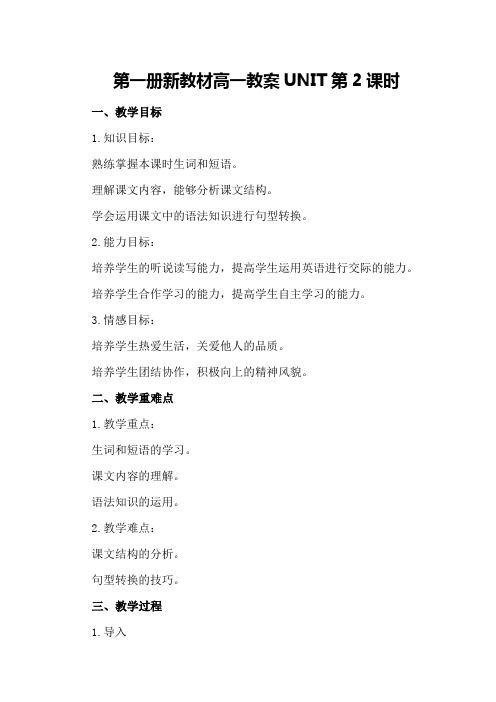
第一册新教材高一教案UNIT第2课时一、教学目标1.知识目标:熟练掌握本课时生词和短语。
理解课文内容,能够分析课文结构。
学会运用课文中的语法知识进行句型转换。
2.能力目标:培养学生的听说读写能力,提高学生运用英语进行交际的能力。
培养学生合作学习的能力,提高学生自主学习的能力。
3.情感目标:培养学生热爱生活,关爱他人的品质。
培养学生团结协作,积极向上的精神风貌。
二、教学重难点1.教学重点:生词和短语的学习。
课文内容的理解。
语法知识的运用。
2.教学难点:课文结构的分析。
句型转换的技巧。
三、教学过程1.导入利用图片或视频导入本课时的话题,激发学生的兴趣。
2.生词学习帮助学生正确拼读和记忆生词。
通过游戏或活动让学生练习生词。
3.课文学习让学生先自主阅读课文,理解大意。
教师带领学生分析课文结构,梳理课文内容。
对课文中的难点进行讲解,帮助学生理解。
4.语法学习讲解课文中的语法知识,让学生掌握句型转换的技巧。
通过练习让学生巩固语法知识。
5.听说练习利用课文中的对话或情景,让学生进行听说练习。
鼓励学生运用所学语法知识进行交际。
6.写作练习让学生根据课文内容进行仿写或续写。
教师对学生的写作进行指导和评价。
7.小组活动将学生分成小组,进行课文内容的讨论或角色扮演。
鼓励学生在小组内积极发言,共同完成任务。
布置相关作业,让学生课后复习。
四、教学反思1.本课时教学过程中,学生的参与度较高,课堂气氛活跃。
3.语法知识的讲解和练习还有待加强,需要更多地关注学生的个体差异。
4.小组活动中,部分学生表现积极,但也有部分学生参与度不高,需要进一步引导。
五、教学资源1.教材:第一册新教材高一英语2.图片、视频等辅助教学材料3.语法练习题4.写作模板六、教学时间1课时七、教学评价1.课堂表现:观察学生在课堂上的参与度、发言积极性和合作学习情况。
2.作业完成情况:检查学生课后作业的完成质量,了解学生对课堂内容的掌握程度。
3.测试成绩:通过单元测试,了解学生对本课时内容的掌握情况。
高一英语教案UNIT2
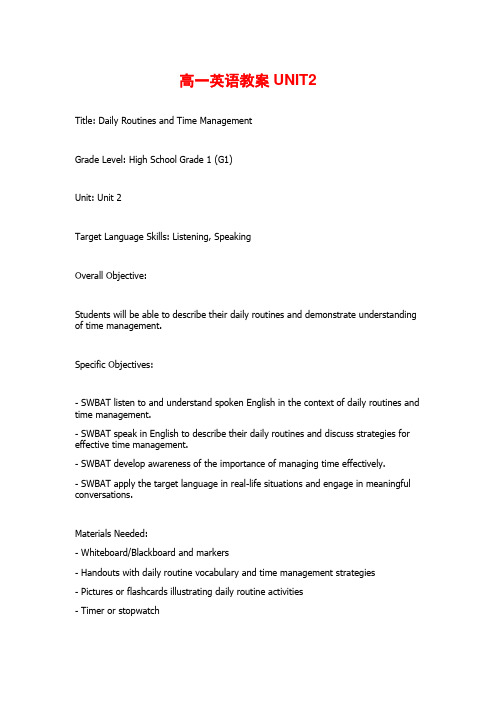
高一英语教案UNIT2Title: Daily Routines and Time ManagementGrade Level: High School Grade 1 (G1)Unit: Unit 2Target Language Skills: Listening, SpeakingOverall Objective:Students will be able to describe their daily routines and demonstrate understanding of time management.Specific Objectives:- SWBAT listen to and understand spoken English in the context of daily routines and time management.- SWBAT speak in English to describe their daily routines and discuss strategies for effective time management.- SWBAT develop awareness of the importance of managing time effectively.- SWBAT apply the target language in real-life situations and engage in meaningful conversations.Materials Needed:- Whiteboard/Blackboard and markers- Handouts with daily routine vocabulary and time management strategies- Pictures or flashcards illustrating daily routine activities- Timer or stopwatchLesson 1: Daily Routines VocabularyIntroduction (10 minutes):- Begin the lesson by asking students what they typically do on a regular school day. Lead a class discussion about common daily routines.- Introduce and elicit different vocabulary words related to daily routines, such as wake up, get dressed, have breakfast, go to school, do homework, etc.- Write the vocabulary words on the board and have the students repeat them after you.Work in Pairs (15 minutes):- Divide the class into pairs. Give each pair a set of flashcards or pictures illustrating daily routine activities.- Instruct the pairs to take turns holding up a flashcard or picture and describing the activity in English to their partner. Encourage them to use the vocabulary words they just learned.Listening Activity (10 minutes):- Play a recording or read out a short dialogue about daily routines for students to listen to.- Ask comprehension questions about the dialogue to ensure students understood the content.Lesson 2: Time Management StrategiesIntroduction (10 minutes):- Give students handouts with different time management strategies, such as making to-do lists, setting goals, prioritizing tasks, etc.- Explain the importance of time management and how it can help individuals be more organized and productive.- Go through each strategy briefly and provide examples to illustrate their application.Pair Discussion (15 minutes):- In pairs, have students discuss the time management strategies they find most effective and why.- Encourage them to share their own experiences and give advice to their partners.Role-play Activity (15 minutes):- Divide the class into groups of four and assign each group a scenario related to time management (e.g. planning a study schedule for exams).- Each group should discuss and role-play their scenario, using the time management strategies they have learned.- Monitor the groups and provide feedback on their language use and application of the strategies.Wrap-up (5 minutes):- Have a class discussion about the role-play scenarios and what the groups learned about effective time management.- Recap the key vocabulary and time management strategies discussed during the lesson.- Assign a short homework task related to time management, such as creating a to-do list for the next day.Note: These lesson plans are only suggestions and can be adjusted or modified based on the needs and abilities of the students.。
高一英语UNIT2教案(新教材)
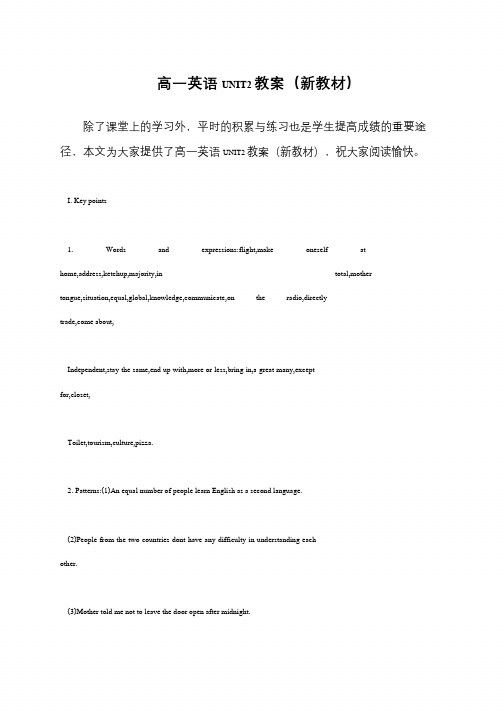
Step3:Listentothetapeandaskthestudenttowritedownrequestsand
demands.Thentell“requests”from“demands”.
Step4:askthestudentstoreadthefollowingdialoguesinpairsoractthemoutif
for,closet,
Toilet,tourism,culture,pizza.
2.Patterns:(1)AnequalnumberofpeoplelearnEnglishasasecondlanguage.
(2)Peoplefromthetwocountriesdonthaveanydifficultyinunderstandingeach
①Whatistherelationshipbetweenthetwo.
②Whataretheytalkabout.
Step2readthedialogueandansweranothertwoquestions.
①WhatisitthatJoecantfindinthebathroom?
②Whycanthefindit?
Thisisthebesttodealwithsomelanguagepoints.
1.Forthefirsttime第一次,初次(介词短语作状语,后不接从句)
Thefirsttime(第一次时,后可接从句)
This∕Itisthefirsttime(后接that引导的定语从句,用现在完成时)
eg.Theywerethereforthefirsttime.他们是第一次到那儿。
湖北英语高一新苏版(1)unit2教案(1—3课时)

湖北英语高一新苏版(1)unit2教案(1—3课时)1.official adj.官方的,正式的; 公务上的,职务上的an official languagee.g.⑴ I can hardly believe that is our official attitude. ( )⑵ His official duties kept him busy. ( )n.官员,政府官员a high officiale.g. a bank\ company\ court\ government official 银行|公司|法院|政府要员officially adv. 正式地;官方地;公开地2. because of prep. because conj.因为;由于e.g.⑴I didn’t buy it ____________________ it was too expensive.⑵He is absent today ___________________his illness.⑶He knew she was crying ___________________ what he had said.⑷We said nothing about it_____________________ his wife’s being there.3.native adj.本国的,本地的be native to…原产于某地的;土产的;当地的e.g. one's native language 本国语;本地语e.g. The tiger is native to India. 这种虎产于印度。
n. 本地人;当地人e.g. You can always tell the difference between the tourists and the natives.4. come up(1) to be mentioned or discussed 被提及;被讨论〔不及物动短,不用于被动语态〕(2) come up (to sb.) to move towards sb. 走到跟前,走进(3) come up to sbcome up with sth. :think of 想出,提出come across 〔偶然〕发明,遇见come out 出来;〔花〕盛开;〔书、产品等〕上市,发行come on 〔用于催促、鼓舞〕快点!加油!;别装腔,得了吧!come about 发生Ex: Fill in the blanks with the above phrases.⑴He ____________ to me and asked for a light.⑵Have you ______________some new ideas?⑶The subject _____________ in conversation.⑷___________, get moving!⑸They ____________ some old photos when they were tidying their room .⑹The flowers ___________ early this year.⑺How did such a thing _______________?⑻When is her new novel ______________?⑼Oh, ___________. Tell me the truth.5. actually adv. === in fact= as a matter of fact= in reality实际上;事实上e.g. He’s actually the boss of a large company. 他实际上是一个大公司的老板。
高中英语必修一unit2教案
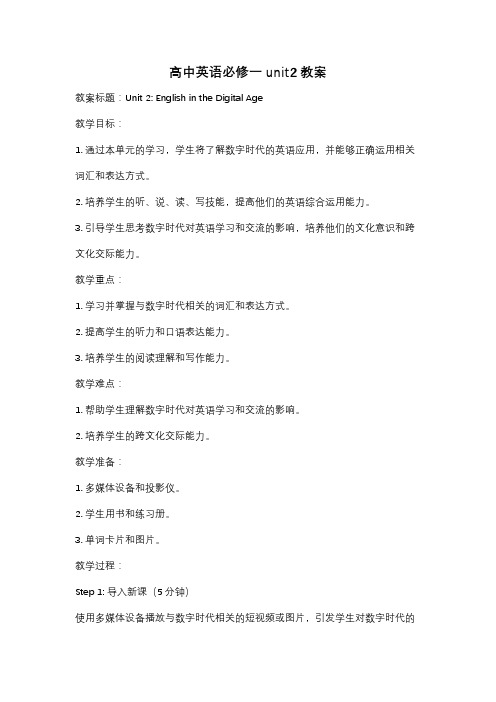
高中英语必修一unit2教案教案标题:Unit 2: English in the Digital Age教学目标:1. 通过本单元的学习,学生将了解数字时代的英语应用,并能够正确运用相关词汇和表达方式。
2. 培养学生的听、说、读、写技能,提高他们的英语综合运用能力。
3. 引导学生思考数字时代对英语学习和交流的影响,培养他们的文化意识和跨文化交际能力。
教学重点:1. 学习并掌握与数字时代相关的词汇和表达方式。
2. 提高学生的听力和口语表达能力。
3. 培养学生的阅读理解和写作能力。
教学难点:1. 帮助学生理解数字时代对英语学习和交流的影响。
2. 培养学生的跨文化交际能力。
教学准备:1. 多媒体设备和投影仪。
2. 学生用书和练习册。
3. 单词卡片和图片。
教学过程:Step 1: 导入新课(5分钟)使用多媒体设备播放与数字时代相关的短视频或图片,引发学生对数字时代的兴趣,并引导他们思考数字时代对英语学习和交流的影响。
Step 2: 学习新词汇(15分钟)教师通过多媒体展示数字时代相关的词汇,并逐一解释其意义和用法。
学生跟读并记忆新词汇,并使用单词卡片进行词汇复习和巩固。
Step 3: 听力训练(20分钟)教师播放与数字时代相关的听力材料,要求学生仔细听取并回答相关问题。
随后,教师与学生一起讨论听力材料中的内容,并帮助学生理解其中的关键信息。
Step 4: 阅读理解(20分钟)学生阅读与数字时代相关的短文或文章,并回答相关问题。
教师可以提供一些问题引导学生思考数字时代对英语学习和交流的影响,并引导学生进行讨论和分享。
Step 5: 口语练习(15分钟)学生分组进行口语练习,讨论数字时代对英语学习和交流的影响。
教师可以提供一些话题和问题,引导学生展开对话,并提供必要的语言支持和指导。
Step 6: 写作训练(20分钟)学生根据所学内容,撰写一篇关于数字时代对英语学习和交流的影响的短文。
教师可以提供写作指导和范文,帮助学生提高写作能力,并对学生的作文进行批改和评价。
- 1、下载文档前请自行甄别文档内容的完整性,平台不提供额外的编辑、内容补充、找答案等附加服务。
- 2、"仅部分预览"的文档,不可在线预览部分如存在完整性等问题,可反馈申请退款(可完整预览的文档不适用该条件!)。
- 3、如文档侵犯您的权益,请联系客服反馈,我们会尽快为您处理(人工客服工作时间:9:00-18:30)。
湖北英语高一新苏版(1)unit2教案(1—4课时)Teaching Aims and demandsTopic: English language and its development; different kinds of English Vocabulary:Words:1. official2.voyage3. native4. elevator 6.apartment 7.base8.petrol 9.gas 10.gradual 11.gradually 12.Danish 13.actually14.present(adj.) 15.vocabulary 16.spelling age tter19.identify 20.fluent 21.fluently22.lorry28.southern29.eastern30.southeastern31.northwestern32.Spanish33.recognize,34.accent35.lightning36.ma’ma37.block38.cab Expressions:thenumberofanumberof.evenif/thoughbeabletocomeup(to)communicatewithbedifferentfrombebasedonclosetomakeuseofmorethanplayanimportantpart/roleinplay/taketheroleofbelieveitornotIt’ssaidthat….It’sbelievedthatexpect(sb.)todosth.giveacommandatpresent…becauseof…comeup…Grammar:indirectspeech(RequsetandCommands)Period1Newwordsandexpressions1.officialadj.〔1〕agreedto,said,done,etc.bysb.whoisinapositionofauthority官方的,正式的e.g.Icanhardlybelievethatisourofficialattitude.我几乎不能相信那是我们的官方态度。
(2)connectedwiththejobofsb.whoisinapositionofauthority公务上的,职务上的e.g.Hisofficialdutieskepthimbusy.他公务繁忙。
;n.apersonwhoisinapositionofauthorityinalargeorganization官员,政府官员e.g.abank\company\court\governmentofficial银行|公司|法院|政府要员officially adv.publiclyandbysb.whoisinapositionofauthority正式地;官方地;公开地e.g.Wehaven’tyetbeentoldofficiallyabouttheclosure.我们尚未接到关闭的正式通知。
2.becauseof prep.因为;由于e.g.Heisabsenttodaybecauseofhisillness.他今天因病而缺席。
adj.connectedwiththeplacewhereyouhavealwayslivedorhavelivedforalongti me本地的;本国的e.g.one'snativelanguage本国语;本地语phrases:benativeto…(ofanimalsandplants动植物)existingnaturallyinaplace原产于某地的;土产的;当地的e.g.ThetigerisnativetoIndia.这种虎产于印度。
n.apersonwholivesinaparticularplace,especiallysb.whohaslivedtherealon gtime本地人;当地人e.g.Youcanalwaystellthedifferencebetweenthetouristsandthenatives.游客与当地人之间的区别一望即知。
eup(1)tobementionedordiscussed被提及;被讨论〔不及物动短,不用于被动语态〕e.g.Thesubjectcameupinconversation.谈话中提到了那个话题。
(2)comeup(tosb.)tomovetowardssb.走到跟前,走进e.g.Hecameuptomeandaskedforalight.他走到我跟前来借火。
comeupwithsth.想出,提出e.g.Haveyoucomeupwithsomenewideas?你想出新的注意了吗?拓展:comeacross〔偶然〕发明,遇见e.g.Theycameacrosstheoldquilt.他们偶然发明了那床旧被子。
comeout出来;〔花〕盛开;〔书、产品等〕上市,发行e.g.Theflowerscameoutearlythisyear.今年花开得早。
Whenishernewnovelcomingout?她的新小说何时出版?Comeon〔用于催促、鼓舞〕快点!加油!;别装腔,得了吧!eon,getmoving!嘿,快点!Oh,comeon.Tellmethetruth.喂,别装了,说实话吧。
comeabout发生e.g.Howdiditcomeaboutthatnoonetrustshim?什么原因没人相信他?5.actually edinspeakingtoemphasizeafactoracomment,orthatsth.isre allytrue实际上;事实上e.g.He’sactuallythebossofalargecompany.他实际上是一个大公司的老板。
Actually,heneverlovesherfromthebottomofhisheart.事实上,他从来没有从内心喜爱过她。
Similarphrases:in(actual)fact=asamatteroffact=inreality=actuallyactual edtoemphasizesth.thatisrealorexistsinfact真实的;实际的e.g.Theactualcostwashigherthanweexpected.实际成本比我们预计的要高。
6.basen.(1)thelowestpartofsth.,especiallythepartorsurfaceonwhichitrestsorst ands根基;基底;底座e.g.thebaseofaglass玻璃杯底座〔2〕aplacewhereanarmy,anavy,etc.operatesfrom基地e.g.amilitarybase军事基地anairbase空军基地〔3〕themainplacewhereyouliveorstayorwhereabusinessoperatesfrom据点;总部;大本营e.g.ThecompanyhasitsbaseinNewYork,andbranchofficesallovertheworld.公司总部设在纽约,分支遍及全世界。
〔4〕〔思想、状况、支持、收入、力量等的〕来源,基础e.g.Sheusedherfamily’shistoryasabaseforhernovel.她以她的家族史作为小说的素材。
v.basesth.on\uponsth.touseanidea,afact,asituation,etc.asthepointfromw hichsth.canbedeveloped以…为基础〔或依照〕e.g.Whatareyoubasingthistheoryon?你这种理论的依照是什么?Youshouldbaseyourconclusiononcarefulresearch.你应该使你的结论以认真研究为依照。
bebasedon\upon〔basesth.on\uponsth.的被动形式〕e.g.HisstoryisbasedonhisownexperiencewhenhewasstudyinginHarvardUniver sity.他的那个故事以他在哈佛大学学习时的个人经历为基础。
wrence.该影片是依照D.H.劳伦斯的小说改编而成的。
7.atpresent现在;目前forthepresent临时;目前e.g.Atpresent,heisonholiday.目前,他正在度假。
Theoldmanisallrightatpresent.这位老人现在特别健康。
presentadj.['prezənt](1)(onlybeforenoun)existingorhappeningnow现存的;当前的e.g.inthepresentsituation在当前形势下thepresentownerofthehouse现在的房主〔2〕(notbeforenoun)~(atsth.)(ofaperson人)beinginaparticularplace出现;在场;出席〔作定语时要后置〕e.g.Therewere200peoplepresentatthemeeting.有200人出席会议。
ManyofficialswerepresentattheopeningceremonyoftheeleventhNationalGame s.特别多官员出席了第十一届全运会的开幕式。
n.['prezənt]〔1〕athingthatyougivetosb.asagift礼物;礼品e.g.birthday\Christmas\wedding,etc.presents生日、圣诞节、结婚等礼物v.[pri'zent]〔1〕~sb.withsth.\~sth.(tosb.)togivesth.tosb.,especiallyformallyataceremon y把…交给;颁发;授予e.g.Theswordwaspresentedbythefamilytothemuseum.这家人把宝剑捐赠给了博物馆。
WhenMr.Brownleftthefirm,thedirectorpresentedagoldwatchtohim.布朗先生离开这家公司时,董事长送给他一只金表。
〔2〕~sb.(tosb.)tointroducesb.formally正式介绍;引荐e.g.MayIpresentmyfiancétoyou?请同意我向您介绍我的未婚夫。
